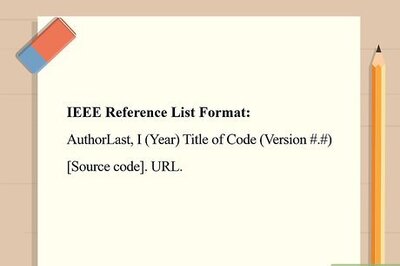
views
"Hi, you should check so-and-so community, your profile figures in it," read the anonymous message. A click later it was found that the innocuous community on this particular social networking site was one that listed profiles of women under the heading 'Top most whores'. Not the kind of networking one has in mind…
'Open with care', read the email, 'the content could be disturbing', it kindly warned. Another tab opens and one nearly threw up on the monitor: staring out where pictures of decapitations, animals being butchered slowly and other unmentionables. All had been defined under "uncensored media you are used to".
The Internet is the one-click option to all possible answers and puerilities. From the so-called 'simpler' pranks on the Net - hacking into someone's account, spamming inboxes or publishing someone's phone number on a dating site - cyberia is also the hub for the Raging Pervs Inc. Necrophilia, beastiality, bomb-making, how to make meth and inject it, child pornography. There's more: you can learn how to live roast your pet dog, sites that tell you how to take a living foetus out of a mother's womb and… have sex with it, sites that promote having sex with your sister, that ask you to kill your parents if they don't let you party and sites that will teach anything and pander to every violent fetish.
Now the latest: the Virginia Campus Carnage has people questioning, if perhaps the Internet had something to do with it.
In Japan, for one, certain videos that promoted killing people and bumping off people in virtual games have been banned: it was found that the youth were not able to discern between virtual killing and reality. Back in 1999 - after the gruesome Columbine High School massacre - a Gallup poll indicated that 82 per cent of those surveyed felt that the Internet was (partially) to blame for the attack as it encouraged violent behaviour in the youth. Compare this to 60 per cent that thought easy access to guns was the reason.
But the question is: Does the Internet actually promote violent, deviant behaviour or does it only provide an easy, technologically -enabled and -enhanced outlet for people to play out their innate, darkest fantasies?
Curiosity killed the cat......and satisfaction brought it back, goes the old saying. Curiosity is not just restricted to cats and the youth comes a close second when it comes to wanting to know and finding out new things. With the Internet, searching for information becomes all that easier. As junior school counsellor Nikhat Grewal, Shri Ram School, New Delhi, puts it: "Children are curious by nature; you cannot curb that. The best way to deal with it is responsible disbursement of information." Grewal points out that today the youth is bored and therefore latches on to the Internet for want of 'better' things to do.
"It is happening across the socio-economic strata, whether it's unemployed youth burning effigies of Shilpa Shetty or youngsters logging on to porn sites. Point being: why aren't these kids at work or college? All this is time pass, it's a way of taking out their frustration: empty mind is a devil's workshop. Parents cannot complain that their child has access to TV and Internet. What is your 10-year-old doing logging on to the net by himself in the first place?"
Controlled watching instead of censorship and complete ban is what psychiatrist Dr Jitendra Nagpal suggests too. "The Internet has a lot of win-win formula attached to it, especially when you come across racing and strategy games. Even the new playstations that have come up stretch a child's imagination in warfare. However, it is up to the parents and other elders to point out that these are games and are not real."
PAGE_BREAK
Dr Nagpal points out further how it took kids a while to realise that the wrestling seen in WWF was not real. "Earlier parents were getting paranoid about some kid twisting another's arm because that's what wrestling was teaching them," he points out. Similarly, he says, it's up to the adults to inform the youth that what happens on the Internet (and video games) is not always real, nor good for them at all times.
Grewal adds, "Communication is of utmost importance: if you know your kid and you keep talking to your kid, you won't have a problem. The youth needs a reasonable explanation or argument to not do something. If you want to stop a video game, explain why you don't want them playing it. When you start talking to your kid at an early age, chances are that s/he would approach you in the adolescent years as well."
Tech can't use itself "Paranoia, vigilance and being a uncaring parent are three different things," adds Grewal. "Every child, no matter what age, needs his privacy. However, it's your job as a parent to ensure that he does not misuse that privacy. The Internet is a way of encouraging a child's curiosity, responsibly. But give your child answers that are age appropriate. Many parents start trying to be 'friends' with their children. Your child is never a friend; you are always the parent. But you can choose to be a friendly parent," she wraps.
Speaking of responsibility, Nagpal points out that this generation seeks instant gratification. "Charm, challenge and chaos have always been associated with adolescence. However, teenage is losing its innocence because these are children of immediate gratification. Look at the dynamics of drug abuse, sexual abuse or anger management: all of them are based on the principle where the postponement of gratification has been delayed and one gets violent."
And the solution? It lies in communicating, according to Nagpal. "Earlier, nature made a child, today it's how you nurture him, it's what he sees around himself. But today the Refrigerator Parents - cold to their child's needs - are substituting real time communication with gadgets and gifts. Inadvertently children are taking resort to near-violent games as a means of gratification. Thanks to non-communication, we have seen adolescents traverse from arguments to altercations to defiance to hostility and finally that hostility into violence."
Fropper.com business head Navin Mittal sums up the argument. "The Internet cannot be blamed for all this violence. In the current Virginia shoot out, the shooting happened with a gun, so blame the gun manufacturers. The Internet provides access and connectivity and has both positive and negative effects. The medium cannot be blamed, it's how people use it. Your education, family background and the way you have been taught to handle things govern what you do on the Net. Then again, terrorists use mobile phones for a lot of things other than making calls… would you say people stop using phones as well?"


















Comments
0 comment